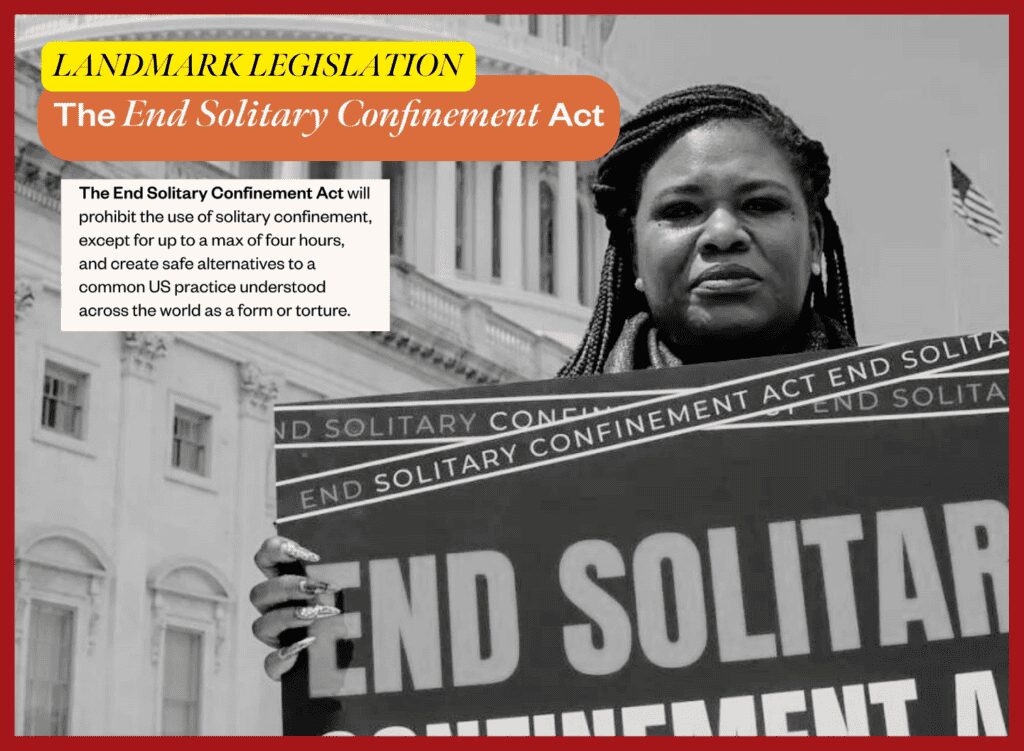With Over 122,000 People in Solitary in U.S. Prisons, Jails, and Detention Centers, including Over 11,650 in Federal Prisons, National Experts Urge the U.S. Congress and President Biden to End This Torturous Practice
(Washington, D.C.) – Today, Congress Members Cori Bush (MO-01), Jamaal Bowman (NY-16), Adriano Espaillat (NY-13), Sydney Kamlager-Dove (CA-37), Rashida Tlaib (MI-12), and Bonnie Watson Coleman (NJ-12) introduced the End Solitary Confinement Act (text here), new and historic legislation that would end solitary confinement in all federal custody and incentivize states and localities to do the same.
Recent polling shows widespread, bipartisan public support for banning solitary, including the specific requirements of this Act, and a growing number of jurisdictions around the country are introducing legislation to end or limit solitary. The End Solitary Confinement Act draws from these best practices and policies to ban solitary beyond a maximum of four hours for emergency de-escalation, require alternatives with access to 14 hours of daily out-of-cell group engagement, and expand due process rights, oversight, and legal enforcement.
Over 150 organizations nationwide have already endorsed the End Solitary Confinement Act, including the NAACP, ACLU, the Advancement Project, LatinoJustice PRLDEF, Southern Center for Human Rights, National Disability Rights Network, and the Vera Institute, and leading human rights and racial justice experts, including members of the Federal Anti-Solitary Taskforce (FAST), lauded the Act’s introduction and urged Congress and the President to act now to fulfill the President’s pledge to end solitary.
Evidence has long shown solitary causes devastating and deadly harm, worsens safety for everyone, and is inflicted disproportionately on Black people, Latina/o/x people, Native people, other people of color, and LGBTQ people. Yet, prisons, jails, and detention centers continue to daily lock over 122,000 people in solitary, including over 11,650 people in federal prisons alone. While President Biden pledged to end solitary, while Bureau of Prisons Director Colette Peters reiterated the harms of solitary and the need to replace it with alternatives involving out-of-cell programs and human engagement, and while Attorney General Merrick Garland investigated its use, the number of people in solitary in federal prisons has increased by 10% (from 10,600) in the 14 months since the President’s May 25, 2022 Executive Order calling for reductions in solitary.
Congress Member Cori Bush (MO-01), lead sponsor of the End Solitary Confinement Act, said: “It is indisputable that solitary confinement is torture. It doesn’t matter what it’s called, whether administrative segregation or restrictive housing or anything else. It leads to self-mutilation, to suicide, heart disease, anxiety, depression, psychosis, mental and physical deterioration and a significantly heightened risk of death. I think of Kalief Browder. He was 16 years old when he was arrested for a crime he didn’t commit and held in solitary confinement for 700 days. When he got out, he died by suicide. An inhumane, cruel, torturous system of criminalization and isolation killed him just like it has killed so many others. It has been clear for a long time that we need to end solitary confinement. There is a growing consensus on this issue. That’s why President Biden pledged to end this practice. That’s why recent polling shows widespread support for ending solitary confinement. The End Solitary Confinement Act will save lives by investing in minds and souls rather than destroying them. Solitary confinement is a depraved and sadistic practice. Genuine community safety will never be achieved so long as we rely on mass incarceration and torture. We will end solitary confinement.”
Congress Member Sydney Kamlager-Dove (CA-37), Co-Lead Sponsor, said: “Solitary confinement is a human rights violation. It is important to end this federally and in all of our states. It is the vestiges of slavery. It is torture. It is incredibly hard and costly to help rehabilitate someone who has suffered the physical and mental distress of being locked up. People need to socialize in order to live and thrive and survive. This bill is an opportunity to stand up against all of that.”
Congress Member Rashida Tlaib (MI-12), Co-Lead Sponsor, said: “Solitary confinement is a moral failure. Across our nation, solitary is inflicted on marginalized communities the most. Over 11,000 people are in solitary in federal prisons alone. Solitary confinement is torture, and torture should have no place in our society. It can lead to real psychological trauma. The American system of mass incarceration perpetuates white supremacy. I am proud to join my colleagues today to speak truth to power. There is much to dismantle. We need to lead with restorative justice and the human dignity of people by ending this dehumanizing practice once and for all.”
Congress Member Bonnie Watson Coleman (NJ-12), Co-Lead Sponsor, said: “This country is really screwed up when it comes to incarcerating people. I know first hand. This is 2023. There is no reason to have people isolated from other people. We know from the pandemic that people in general can’t handle isolation. Now think about people in a small cell, with no air, no sunlight, no human contact. In this country that is supposed to be humane, that stands up for humanity and rights across the world, we are sorely lacking in doing what we say. It is immoral. It is unfair. It has been discriminatory. It will continue to be discriminatory. This bill sets up parameters under which a person can be confined. This bill guarantees that people who are incarcerated have social time, skill-building time, sessions that involve programming or therapy. This is humanity in action. We have a responsibility to stand up for voices that are not otherwise heard. America needs to ask ourself, where are our priorities?”
Pamela Winn, Founder of RestoreHER and survivor of solitary, said: “America has no regard for human life or human rights. The UN recognizes solitary confinement as torture and there is documented scientific research that shows irreversible or even fatal psychological damage caused by solitary. Yet, people continue to be placed in solitary confinement for days, months, years, and even lifetimes. I speak from my personal lived experience. I was pregnant, shackled, which caused me to fall, miscarrying at 20 weeks, my baby thrown in the trash, and then being immediately thrown in solitary confinement for eight months. There is no day, no night, no time, just your thoughts. My thoughts were of the horrific pain as I lay in my cell for hours waiting for someone to check on me, the blood all over the cell when the door opened, the nurse telling me I had lost my baby, and hearing the guards say that they threw my baby in the trash, OVER and OVER and OVER for eight months. Today I struggle with low tolerance of family and friends, have awkward times of not knowing how to interact with my grandbaby that leaves me in tears, and lack intimacy in my personal relationships. I sleep curled up in one corner of my king sized bed and challenge myself to sprawl all over as therapy. I often feel displaced, uncomfortable, and agitated in crowded places, preferring to be alone, not going out for entertainment. As President of RestoreHER US.America, I fight tirelessly to ban solitary confinement of pregnant women and all people. I am calling on America to stop the torturous cruel treatment of human beings. I am calling on them to enact the End Solitary Confinement Act.”
Johnny Perez, Director, U.S. Prisons Program, National Religious Campaign Against Torture, said: “As someone who has personally endured the torment of solitary confinement, I can attest to the devastating toll it takes on one’s mental and emotional well-being. The End Solitary Confinement Act is a beacon of hope for those incarcerated in federal facilities nationwide, offering a chance for reform and redemption within our criminal justice system. I implore Congress to swiftly pass this critical legislation, for it is not only a matter of justice, but a matter of preserving human dignity and restoring hope for those who have been silenced and isolated for far too long across the United States.”
Jerome Wright, Co-Director of the #HALTsolitary Campaign, said: “Solitary confinement is one of human beings’ greatest inhumanity to other human beings. It is torture. Solitary causes devastating harm and death, while worsening safety for everyone. It should have no place in our society. The End Solitary Confinement Act would be an urgent and critical step in the struggle for human rights and racial justice. Congress must waste no time to pass this Act, and the President must sign it into law.”
Tammie Gregg, Director of the American Civil Liberties Union’s Stop Solitary Campaign, said: “Solitary confinement is a torturous practice that causes immense suffering and severe damage, while also making everyone less safe. It is wrong, and it must end now. The End Solitary Confinement Act provides an historic opportunity for Congress and the President to end solitary confinement in a real and meaningful way while fostering engagement- and program-based interventions proven to be much more effective at improving safety.”
Jerome Wright, Co-Director of the #HALTsolitary Campaign, said: “Solitary confinement is one of human beings’ greatest inhumanity to other human beings. It is torture. Solitary causes devastating harm and death, while worsening safety for everyone. It should have no place in our society. The End Solitary Confinement Act would be an urgent and critical step in the struggle for human rights and racial justice. Congress must waste no time to pass this Act, and the President must sign it into law.”
Jessica Sandoval, Director, Unlock the Box Campaign, said: “The End Solitary Confinement Act is urgently needed legislation to stop the torture of solitary confinement in U.S. prisons, jails, and detention centers. In order to stop torture, reduce suffering, save lives, and make everyone safer, Congresswoman Bush’s bill will end solitary confinement for all people and utilize proven alternative interventions involving full days of out-of-cell group programming and engagement. Over 120,000 people in local, state, and federal custody, including over 11,000 people in federal prisons alone, are being tortured right now — disproportionately Black, Latina/o/x, and indigenous people and other people of color and many for months and years at a time. With widespread bipartisan public support across the country for ending solitary confinement and with a growing number of jurisdictions introducing and enacting legislation to end or limit the practice, now is the moment for federal policymakers to lead. Congress must act quickly to pass the End Solitary Confinement Act and President Biden must sign it into law to fulfill his pledge to end solitary once and for all.”
CJ Sandley, Staff Attorney, Center for Constitutional Rights, said: “The Center for Constitutional Rights has a long history of challenging the use of isolation in U.S. prisons and immigration detention centers. In particular, many of our clients have been placed in solitary confinement in retaliation for their efforts to speak up about the fact and conditions of their confinement. The Center for Constitutional Rights firmly believes solitary confinement is torture. The End Solitary Confinement Act is a monumental step toward eliminating this abhorrent practice in federal carceral systems, and we are proud to support it.”
BACKGROUND:
On Recent Nationwide Poll: Recent nationwide polling data released by Data for Progress shows widespread bipartisan support for the specific provisions banning solitary confinement contained in the End Solitary Confinement Act. Specifically, voters – including 78% of Democrats, 61% of Independents, and 51% of Republicans – support by a +32-point margin: “legislation that would limit solitary confinement to a maximum of 4 hours per day [and] ensure that anyone in solitary confinement receives regular support from medical and mental health staff, and that solitary confinement is used only for emergency situations involving serious physical injury”.
On President Biden’s Unfulfilled Commitment to End Solitary Confinement: President Biden and Vice President Harris pledged to end solitary confinement. President Biden issued an Executive Order on May 25, 2022, directing the Attorney General to report on progress made toward limiting the use of solitary confinement and other forms of restrictive housing within 180 days of the order. Yet, the use of solitary in federal prisons has increased since that executive order.
On Widespread Infliction of Solitary Confinement: Over 122,000 people are locked in solitary confinement on a given day in U.S. prisons and jails, not even including immigration detention and youth detention, and hundreds of thousands of people are subjected to solitary over the course of the year. The federal Bureau of Prisons alone is locking more than 11,000 people in solitary on a given day, disproportionately Black people, Latinx people, Native people, and other people of color. People are locked in solitary for days, weeks, months, years, and decades.
On Torturous & Counterproductive Harm of Solitary: Solitary confinement causes self-mutilation, heart disease, anxiety, depression, and psychosis. It makes jails and outside communities less safe. Studies have indicated that people in solitary are seven to 12 times more likely to engage in self-harm, and five to six times more likely to die by suicide, than the rest of the prison or jail population – a population already at high risk of self-harm and death by suicide. Even after release from jail or prison, a study of hundreds of thousands of people released from prison in North Carolina over a 15 year period found that people who had spent time in solitary were significantly more likely to die by suicide and other causes. Research shows that even only one or two days in solitary leads to significantly heightened risk of death by accident, suicide, violence, overdose, and other causes. On the day she died, Layleen Polanco was locked in solitary for only two to three hours. By causing people to deteriorate, solitary makes it more likely, not less, that people will engage in harmful acts, and people who have spent time in solitary are more likely to be rearrested after release.
On the Benefits of Alternatives to Solitary: Best practices in youth and mental health facilities limit isolation to minutes or hours at most. The evidence is clear: what actually works to address violence is the exact opposite of solitary: access to full days of out-of-cell pro-social program-based interventions like the CAPS program in NYC jails, the Merle Cooper Program in NYS, and the RSVP program in San Francisco jails. For example, the RSVP program included people who had carried out acts of assault, sexual assault, other violent acts, and repeated “heinous” acts, and led to a precipitous drop in violence among participants to the point of having zero incidents over a one year period.
On the Growing Momentum for Policies Across the Country to End or Limit Solitary: Recent years have seen a massive increase in the number of jurisdictions across the country introducing or passing legislation to end or restrict solitary confinement. Current legislation pending in New York City jails with veto-proof supermajority support would – similar to the End Solitary Confinement Act – end all solitary confinement beyond four hours immediately following an incident for purposes of emergency de-escalation, and require that all people in the jails, including all people in any alternatives to solitary confinement, have access to at least 14 hours of out-of-cell time with access to out-of-cell group programming and activities. States like New York, Colorado, North Dakota, New Jersey, and Connecticut have all taken steps in recent years to significantly reduce the use of solitary confinement.
Unlock the Box is a coalition of organizations and movement leaders who partner with state and local campaigns across the United States with the common goal of ending the use of solitary confinement for all people. Unlock the Box pursues this goal by
working simultaneously on national, state, and local levels with solitary survivors, family
members, advocates, community and faith groups, legislators, healthcare and corrections experts, and others dedicated to ending state-sponsored torture.




